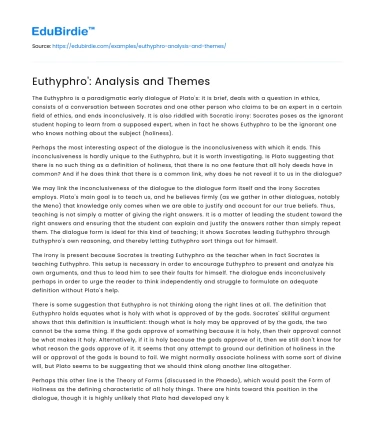The Euthyphro is a paradigmatic early dialogue of Plato's: it is brief, deals with a question in ethics, consists of a conversation between Socrates and one other person who claims to be an expert in a certain field of ethics, and ends inconclusively. It is also riddled with Socratic irony: Socrates poses as the ignorant student hoping to learn from a supposed expert, when in fact he shows Euthyphro to be the ignorant one who knows nothing about the subject (holiness).
Perhaps the most interesting aspect of the dialogue is the inconclusiveness with which it ends. This inconclusiveness is hardly unique to the Euthyphro, but it is worth investigating. Is Plato suggesting that there is no such thing as a definition of holiness, that there is no one feature that all holy deeds have in common? And if he does think that there is a common link, why does he not reveal it to us in the dialogue?
Save your time!
We can take care of your essay
- Proper editing and formatting
- Free revision, title page, and bibliography
- Flexible prices and money-back guarantee
We may link the inconclusiveness of the dialogue to the dialogue form itself and the irony Socrates employs. Plato's main goal is to teach us, and he believes firmly (as we gather in other dialogues, notably the Meno) that knowledge only comes when we are able to justify and account for our true beliefs. Thus, teaching is not simply a matter of giving the right answers. It is a matter of leading the student toward the right answers and ensuring that the student can explain and justify the answers rather than simply repeat them. The dialogue form is ideal for this kind of teaching; it shows Socrates leading Euthyphro through Euthyphro's own reasoning, and thereby letting Euthyphro sort things out for himself.
The irony is present because Socrates is treating Euthyphro as the teacher when in fact Socrates is teaching Euthyphro. This setup is necessary in order to encourage Euthyphro to present and analyze his own arguments, and thus to lead him to see their faults for himself. The dialogue ends inconclusively perhaps in order to urge the reader to think independently and struggle to formulate an adequate definition without Plato's help.
There is some suggestion that Euthyphro is not thinking along the right lines at all. The definition that Euthyphro holds equates what is holy with what is approved of by the gods. Socrates' skillful argument shows that this definition is insufficient: though what is holy may be approved of by the gods, the two cannot be the same thing. If the gods approve of something because it is holy, then their approval cannot be what makes it holy. Alternatively, if it is holy because the gods approve of it, then we still don't know for what reason the gods approve of it. It seems that any attempt to ground our definition of holiness in the will or approval of the gods is bound to fail. We might normally associate holiness with some sort of divine will, but Plato seems to be suggesting that we should think along another line altogether.
Perhaps this other line is the Theory of Forms (discussed in the Phaedo), which would posit the Form of Holiness as the defining characteristic of all holy things. There are hints toward this position in the dialogue, though it is highly unlikely that Plato had developed any kind of technical theory by the time the Euthyphro was written. Perhaps the absence of this formulated theory is what leads the dialogue to end inconclusively.






 Stuck on your essay?
Stuck on your essay?

